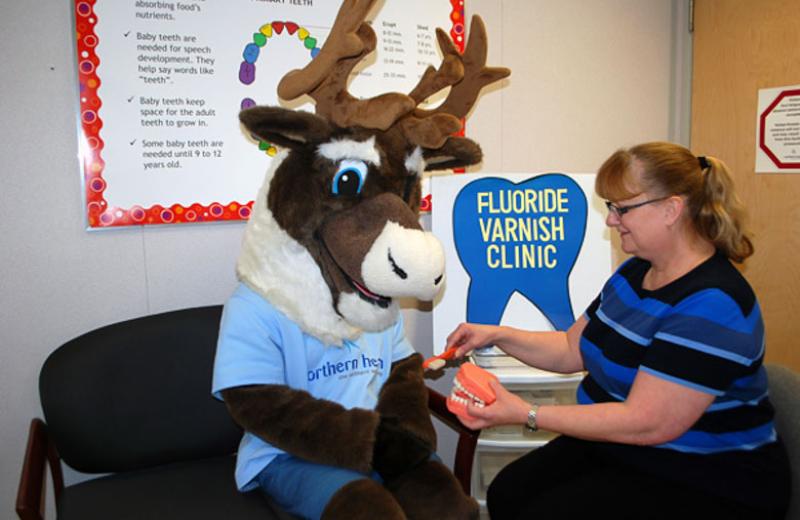One of the things that always strikes me as odd is that the mouth is often considered a separate body part when we’re discussing health issues. Did you know an unhealthy mouth can affect your appearance, social acceptance, and ability to eat and sleep? An infection in the mouth comes from a bacterial infection; these bacteria have the potential to travel through the bloodstream and affect other organs. Many people don’t realize that oral infections can impact chronic diseases such as diabetes, asthma, arthritis, and even birth rates.
Your mouth is an important part of your body! And we all need to treat it as such in order to be and stay as healthy as possible.
Empowering healthy dental behaviours
I’m a dental regional program lead – I teach and provide resources and tools to empower public health staff to support our northern population around adopting healthy dental behaviours. Dental public health staff work towards helping people achieve the skills they need to start making small changes - commonly called brief action planning. We want them to start today to make a small change.
How small changes can make a big difference
If someone decides today to use fluoride toothpaste daily (or better yet, twice daily), when previously they did not, the science tells us that their long range dental decay rate will reduce.
If today, a teenager starts chewing a sugar-free piece of gum after a snack, the length of time of the acidic attack on their teeth will diminish, and they will have less decay over their lifetime.
If someone makes a small change every day, the dental preventive effect is maximized and continues to increase.
I dream of a day when all dental treatment needs are covered by a universal dental plan; however, at this time, I am happy to focus my attention on what I can practically influence.
The cost of prevention: a positive return on investment
My perspective is that the cost of prevention is cheaper than the cost of chronic disease treatment in hospital. I once had a client who had diabetes and a mouth full of decayed teeth, coupled with no funding to fully treat the oral health issue. Not being able to eat impacted this person’s diabetes, and uncontrolled diabetes affected their emotional stability, resulting in a long hospital stay. Chronic and untreated oral infections take a toll on the body and in this case, the finances of the health care system.
Advocating for change
I continue to advocate for the best avenues to help clients access dental care, but every day I encourage my staff to implement the practical applications of dental prevention. Some of these include:
- Using fluoride toothpaste twice a day.
- Reducing frequent sipping on sweetened beverages.
- Practicing empathy and respect so patients feel comfortable.
It takes many caring individuals across a broad spectrum of disciplines to implement change. I continue to believe change for the better is always possible… even if it’s only one tooth brushing session at a time.














Comments
Please email us your contact info to healthpromotions@northernhealth.ca and we can forward you on to the appropriate contact for more information.